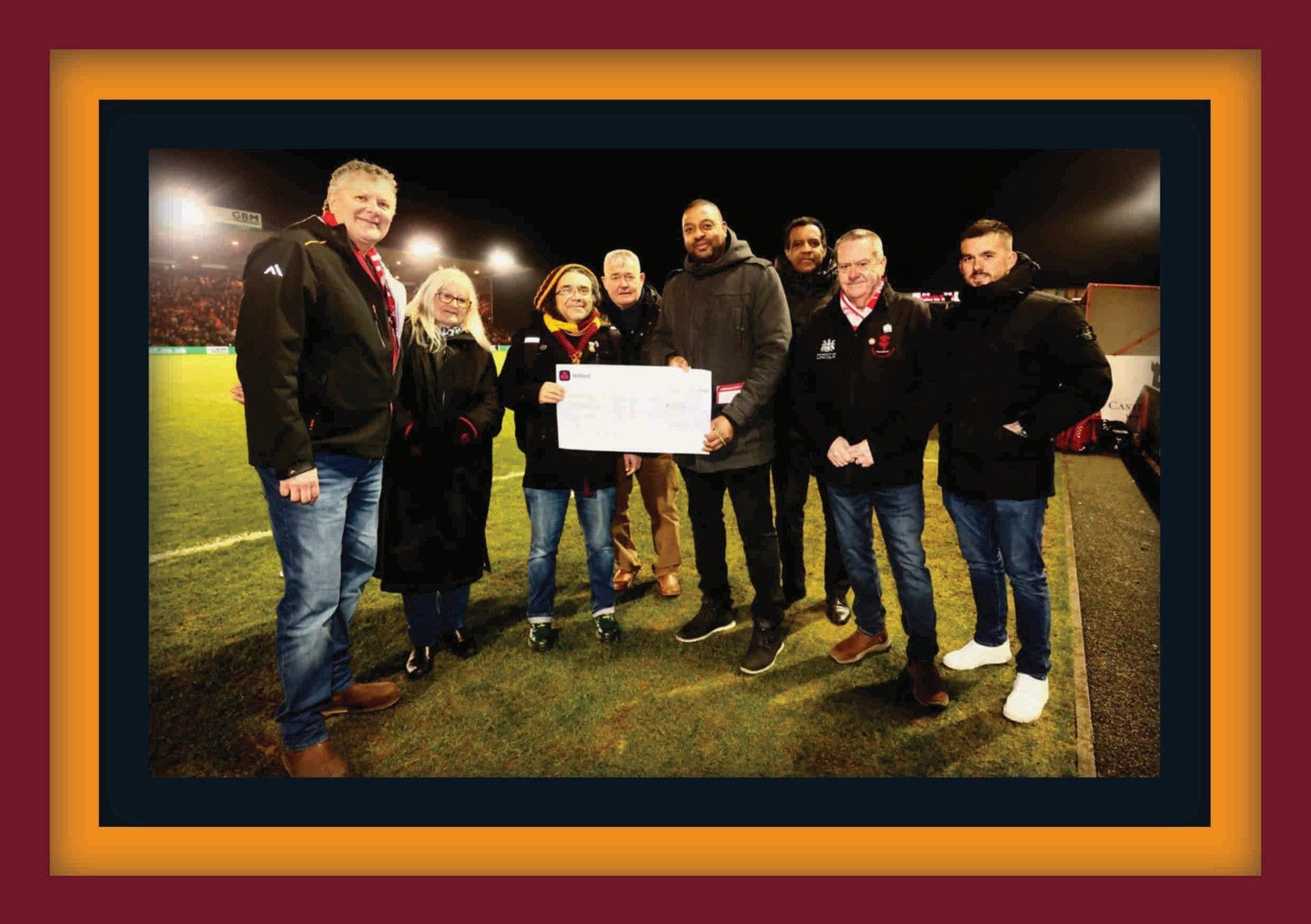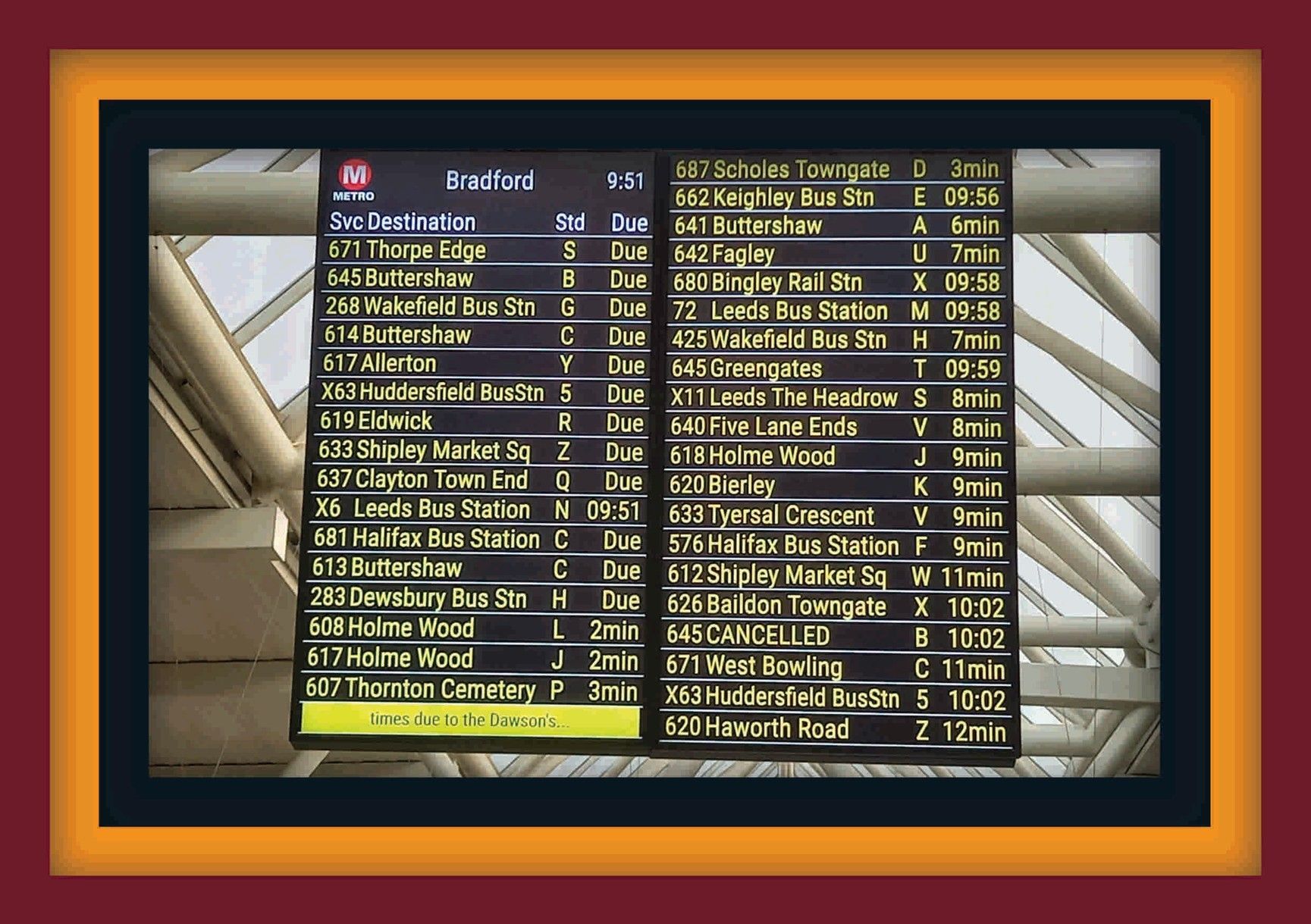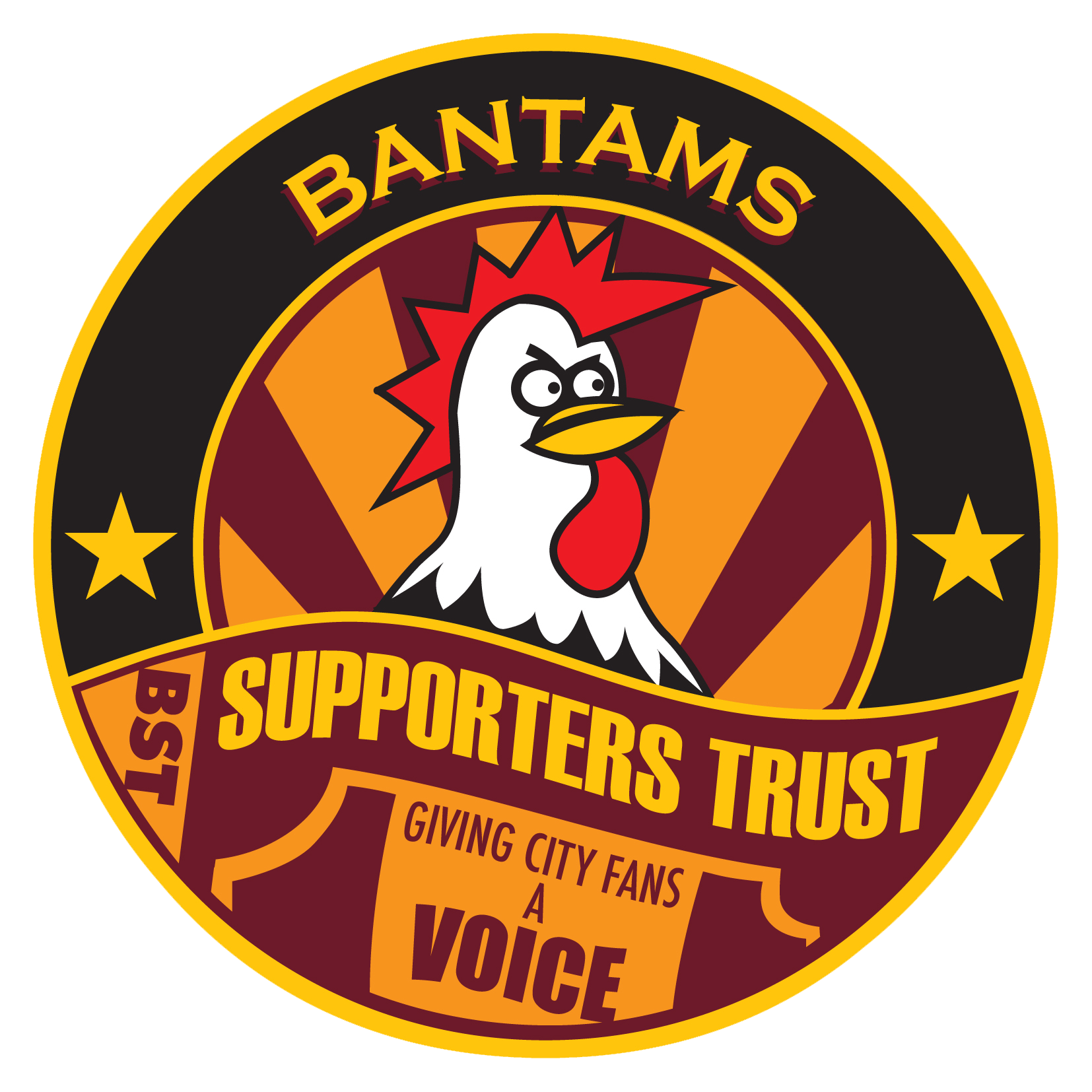BANTAMS SUPPORTERS TRUST
We are the Bantams Supporters Trust
Welcome to the official home of the Bantams Supporters Trust — formerly known as the Bradford City Supporters Trust.
We are a fully independent, democratic, and not-for-profit organisation, proudly owned by our members and operated by dedicated volunteers. Our mission is to champion the interests of Bradford City supporters and strengthen the bond between fans and their Club.
Membership is completely free and open to all City fans who share our commitment to the long-term, sustainable success of Bradford City AFC.
Trust News

Representatives of the Lincoln City Former Players Association and the Red Imps Community Trust presented Bantams Supporters Trust with a cheque to go to the Bradford Burns Unit for £2,000 at our away fixture with Lincoln City at our recent away fixture (27 January). The Bantams Supporters Trust would like to thank them for their generosity.

The Trust would like to pay our respects to great former City player, coach and manager, Terry Yorath, who sadly passed away recently at the age of 75 after a short illness. Starting his career at Bradford City as a player / coach in 1982, making 34 appearances as a player. He was a brilliant coach and assistant manager to Trevor Cherry, being a key figure in our 1984/85 Championship winning side. In fact Cherry was not the same without Terry when he went to manage Swansea City in 1986. Terry was deeply affected by the Valley Parade fire disaster after helping supporters evacuate the stadium. He was also a coach under Paul Jewell taking the Bantams into the Premier League. Terry’s time as manager at City didn't go to plan after taking the reigns from Terry Dolan in Feb 1989 and got sacked just over a year later in the bottom 3 of the old 2nd division. He began his very successful professional playing career with Leeds Utd, winning the old 1st division Championship in 1974 in the Don Revie era, which also had Trevor Cherry in that season’s squad. Also, Terry played for Coventry, spurs, Vancouver Whitecaps, Swansea and of course Wales where he captained 42 of his 59 caps. When he was manager of Wales he came close to taking them to the World Cup finals in 1994. Our condolences go to his family and those close to him. Rest in Peace, Terry Yorath.

Many thanks to everyone that attended our AGM. It is always fantastic to see people that support us making an effort to attend either in person or on Jitsi Meet. Unfortunately, the numbers present did not make the meeting quorate, although it was a really good effort. To ensure that we are quorate within our rules we have to have a minimum of 20 in attendance to be able to carry out and agree the business of the meeting. To remedy this, our rules allow us to provide you with another opportunity to attend our AGM meeting with a minimum 7 days notice so that we can ratify our AGM business. The date for this meeting is Monday 22 nd December from 7pm at Jacobs Well near the Interchange. We are also having our Christmas social on the same evening – an added incentive for coming along and finding out more about the Trust. And for members it is a second chance to attend. There is another chance to come in online if you can’t make it in person via Jitsi Meet, which is a free video Conferencing platform. The link is here . Location and parking Jacobs Well is in Bradford city centre, near the Interchange and situated on the left hand side before the Jacobs Well roundabout. If you are coming by car, there is parking on Neal St. behind the Jacobs Well, or behind the Media Museum and free parking further up Neal Street near the Police Station.

The Trust writes to politicians and engages with the Club on how best to get City fans to and from VP on match days and on a night. First of all, the Trust is aware that many supporters rely on buses to and from matches. We are also aware that many more would use the buses if services were more frequent, reliable, and run for later on an evening during the week. As a campaign interest, it always scores well on our online surveys. After recently getting a response from the West Yorkshire Combined Authority (WYCA) Bus services Team, we had an opportunity to Speak to Adam Keizer, Bradford City’s Sustainability Lead, and we met on Monday 10 th November. We discussed the special offer with First bus – the matchday code which is now valued at £4.50 and is available during the week. It also has a discounted monthly travel for £10 off a monthly ticket for season ticket holders. We discussed the letter we received from the WYCA which raised the fact that the Mayor “ has made the decision to Franchise the bus network in West Yorkshire, this is a lengthy process with services becoming operational from April 2027”. One of the reasons it will take so long, it was said, is because all the bus companies will operate until their contracts finish. Up to now, the bus transport system is deregulated meaning services are run on a for-profit basis by private bus operators who set the routes, fares and timetables. In the UK bus franchising means that a local transport authority (in our case the WYCA) takes back control of planning the bus network, including routes, timetables, and fares, and then awards contracts to private companies to operate these services. This has come into being as a result of the Bus Services Act 2025 - is a new UK law that became effective in late October 2025, aiming to improve bus travel by giving local authorities more power to franchise services and allowing them to own bus companies. The Club want to survey season ticket holders to do a wider study around the transport routes of where people live and are looking to work with Bradford University on this research. They are also looking at partnerships with rail links and what other clubs are doing to support fan travel. They are also looking at our Community Foundation and digital resources to help. The response from the WYCA did give insight into the fact that bus operators were asked to ‘ consider providing additional provision on these days’ – when there are evening matches. Matchday is embedded in the Clubs sustainability plans because of the amount of people it brings to the stadium, and the Club therefore feel responsible as to how it provides supporters it’s services. It wants to get a good understanding about how supporters get to and leave the stadium. They have plans to have matchday ambassadors to help supporters but are not sure what this could look like. They want to get this up and running from February onwards As Bradford City are part of a network of professional football clubs they can all help each other with advise on what they do best. The trust is also part of it’s own network of Supporters Trusts and other fans groups and through our network we can also provide help and advice, and we can find out whether sustainability embassadors are something that is being done at other clubs. The Club is signed up to EFL Green Clubs , a voluntary scheme that encourages clubs to improve their environmental practices and operations. The Club is ‘Silver’ in awards status and hopes to be ‘gold’ next season for its’ efforts. It is committed to being responsible for carbon emissions and supports the target of reaching net zero. According to the Dirty Tackle report, professional soccer’s annual carbon emissions are 66 million tons of CO2e. Sponsorship and air travel are the two biggest factors, but merchandise waste often passes unseen as a hefty contributor. The UK football industry, primarily through the Premier League and its clubs, has committed to achieving net-zero emissions by 2040, with an intermediate goal of a 50% reduction in greenhouse gas (GHG) emissions by 2030. Here are some of the headline grabbers of what the Club have achieved so far in terms of environmental sustainability through the Greener Bantams campaign: From next year over 90% of the stadium energy consumption will be supplied from renewable energy (inc the solar panels at the stadium) 96% of our matchday waste is recycled - the rest is used for refused derived fuel (RDF) - none of our waste goes to landfill Our macron playing kits are made from sustainable materials (recycled plastics) The club has installed EV charging points and bike racks at the stadium, we also have these at our training ground We have committed to planting a tree for every goal we score to support biodiversity in the local area We will be calculating our carbon footprint this season to use as a baseline and set long term reduction targets We will be looking to do some fan travel surveys to look at how we can support sustainable travel options on matchdays Click here for the Club’s Greener Bantams annual report from 2025/26 season and latest sustainability news. The Trust is doing it’s own extensive survey that covers a wide range of issues both, Bradford City and wider national for the regular match-going City fan and should take around 10-15 minutes to complete. The results will help the Trust Board in understanding your views and enable the Trust campaign more effectively on your behalf. We last did this in the 2023/24 Season, and we want it to be bigger and more successful than that. Click here to take part.



